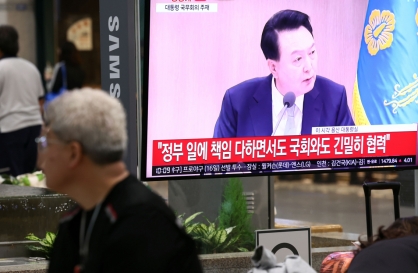[James Bacchus] Cheating isn’t going to help China win
James Bacchus
By BloombergPublished : July 16, 2018 - 16:58
 The chances of defusing a US-China trade war seem bleak, so long as American complaints remain focused on China’s drive to dominate the industries of the future. The US has justified concerns about the methods China has chosen to pursue its “Made in China 2025” industrial plans. China refuses to accept any curbs on an effort seen as crucial to its future economic vitality.
The chances of defusing a US-China trade war seem bleak, so long as American complaints remain focused on China’s drive to dominate the industries of the future. The US has justified concerns about the methods China has chosen to pursue its “Made in China 2025” industrial plans. China refuses to accept any curbs on an effort seen as crucial to its future economic vitality.In fact, not only could China achieve its goals without resorting to dubious means -- arguably, that’s the only way to do so.
China’s desire to resume the place it long held as one of the world’s leading economies is perfectly legitimate. The Chinese people aren’t forever ordained to labor on a low-cost factory floor for the rest of the world. Their leaders are right to want to climb up the ladder of comparative advantage and develop a more innovative, value-added economy driven by high-tech manufacturing.
Nor can China be blamed for suspecting the motives behind criticism from the US and other Western countries. For a century and more -- in the shameful Opium Wars and in many other acts of imperialism -- European countries and, to a lesser extent, the US exploited a weakened and defenseless China. Even now, some American strategists openly argue that the US should aim to prevent China from emerging as a technological and military rival.
So it’s important to be clear about what’s at issue in China’s technological drive. Technically, the rules of the World Trade Organization don’t prevent China or any other signatory from having an industrial policy. Similar initiatives not only helped power the rise of the US in the 19th century but, more recently, that of several of China’s Asian neighbors, from Japan to Singapore.
On the other hand, “Made in China 2025” does violate WTO strictures that forbid discrimination against fellow members. Many of the plan’s local-content and licensing requirements, rigged standards, homegrown technical regulations and market-distorting subsidies are designed to protect Chinese companies against foreign competition. Commercial and cyberespionage, forced transfers of technology and rampant intellectual property theft are all plainly illegal under WTO rules.
What this means, first of all, is that the WTO system is perfectly capable of holding China to account for many of its trade abuses. If a coalition of China’s trading partners, led by the US, were to bring a detailed complaint backed by facts before the body’s appellate court, they would almost certainly win. And China, which has respected adverse judgments in the past, could for the most part be expected to comply, in part because the alternative would entail expensive economic sanctions.
More important, Chinese leaders should recognize that remedying such complaints is in their own interests. China isn’t going to climb the competitive ladder by discriminating against foreign goods and services, shutting out foreign companies, conditioning market access on the handover of intellectual property, and generally undermining foreign competition in China. Countries such as South Korea and Taiwan did shelter some industries while fighting their way out of poverty. But no country has continued to grow over time without being open to trade and investment from the wider world.
Economically, China’s discriminatory policies deny local companies the incentives and the investments that come with foreign competition. They inhibit the capacity of firms to innovate, impede their access to cheaper and better inputs in production, and keep them from benefiting from other gains from trade. China’s protectionism isn’t any less foolhardy than that of US President Donald Trump.
For all the apprehension the “Made in China 2025” plan has provoked, this latest Chinese venture into state-directed economic planning is likely to produce just as many duds as China’s previous five-year and other strategic plans. Already there are reports that local and regional authorities are simply dusting off and rebranding their old make-work wish lists in search of new state subsidies. The result could well be still more debt, still more overcapacity and not much more progress for China.
Instead of favoring and subsidizing hand-picked “winners” that might well turn out to be losers, China should focus more single-mindedly on devoting resources to basic research and development -- a recent emphasis which generally doesn’t raise any WTO legal concerns. The US, which has historically outspent China as a percentage of GDP but is foolishly cutting back, should do the same.
The two keys to national competitiveness for any nation are to be open to the wider world and to do all that must be done domestically to prepare workers to compete. Governments should focus on developing capabilities and enabling the market to work its creative and productive wonders, rather than dictating outcomes. That’s no less true for China than it is for the US.
James Bacchus
James Bacchus is a former chief judge for the World Trade Organization, a former member of the US Congress and author of “The Willing World: Shaping and Sharing a Sustainable Global Prosperity.” -- Ed.
(Bloomberg)






![[From the Scene] Monks, Buddhists hail return of remains of Buddhas](http://res.heraldm.com/phpwas/restmb_idxmake.php?idx=644&simg=/content/image/2024/04/19/20240419050617_0.jpg&u=20240419175937)







![[From the Scene] Monks, Buddhists hail return of remains of Buddhas](http://res.heraldm.com/phpwas/restmb_idxmake.php?idx=652&simg=/content/image/2024/04/19/20240419050617_0.jpg&u=20240419175937)

![[KH Explains] Hyundai's full hybrid edge to pay off amid slow transition to pure EVs](http://res.heraldm.com/phpwas/restmb_idxmake.php?idx=652&simg=/content/image/2024/04/18/20240418050645_0.jpg&u=20240419100350)

![[Today’s K-pop] Illit drops debut single remix](http://res.heraldm.com/phpwas/restmb_idxmake.php?idx=642&simg=/content/image/2024/04/19/20240419050612_0.jpg&u=)